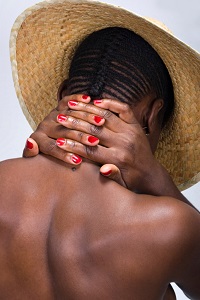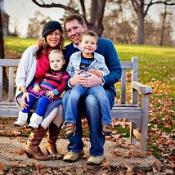 Freshman year of college was a difficult time for me. Many things had changed, I was away from home for the first time, I was not among close friends, and my course load was semi-difficult for me to adjust to. With all that going on, there was a noticeable change to my appearance that I couldn’t identify with. There was a round reddish raised sore on my left cheek. I tried to recall in my mind if I had done something to myself to cause this, but nothing came to mind.
Freshman year of college was a difficult time for me. Many things had changed, I was away from home for the first time, I was not among close friends, and my course load was semi-difficult for me to adjust to. With all that going on, there was a noticeable change to my appearance that I couldn’t identify with. There was a round reddish raised sore on my left cheek. I tried to recall in my mind if I had done something to myself to cause this, but nothing came to mind.
Combing my hair in the mirror also became unnerving, because it had begun to fall out more than that average 100 strands a day. My scalp was visible. I figured out where the hair was disappearing from; I was balding on a section of my scalp.
I knew I had been stressing from school and being homesick, but I couldn’t figure out why my skin and scalp were being affected by my stress. That’s when I really began to panic. My mother suggested I come home so my grandmother, who was a registered nurse, could take a look and see what was happening. I was on the next thing smoking going home.
As my grandmother examined my face and scalp, she was clueless about my condition. She concluded that I needed to see a dermatologist. A couple of days later, I was in the doctor’s office being poked and prodded as if I were a science project.
The diagnosis: discoid lupus. It was determined that I didn’t have systemic lupus—there were traits, but I definitely had discoid. I didn’t understand what discoid lupus was, so my reaction was nothing more than a head nod and wondering, “Now what?”
My dermatologist did not have a sound of urgency or true concern in his voice, so I made myself believe that this wasn’t very serious and I would be just fine. The information that I gained from that appointment was:
- There is no certain cause for this disease.
- This disease is more prevalent in African-American women than Caucasians.
- It can affect my face and scalp.
I was handed some cream for my face and told my hair would grow back. That was the end of the appointment. I never saw that dermatologist again, and I put the thought of lupus out of my mind.
Almost twenty years passed; my life was moving along. Planning a wedding brought on demanding pressures that I had not anticipated. Day by day, my face began to show signs of redness, and hair was falling out. I believed that I was having an acne breakout and needed to wash my hair because it was falling out.
I had not thought about symptoms of discoid lupus, so in my mind that was not a possibility. Dismissing all the signs, I went on with my wedding and honeymoon, which happened without a hitch. Coming back to reality, I decided it was time to see a dermatologist.
What I feared became true: my discoid lupus had awakened from its 20-year nap. This time it came with a vengeance. Instead of one lesion, I had several on my face and ears, and my scalp was bald in more than one area. Depression began to set in because I couldn’t understand why it came back ten times worse than before.
If I could identify two things I overlooked during both of my episodes, they would be my high stress level and the symptoms I was experiencing at the time. Looking back, I was under some unbelievable stress both times, and I dismissed the rashes and hair falling out as just a natural aspect of my life.
I have discoid lupus, which, whether active or dormant, is for life. I must pay attention to those little things—stress, fatigue, rashes, hair falling out, etc—in order to gain control of this outbreak, which will limit the hair loss and skin abrasions.
As an African-American female diagnosed with a form of lupus, I have pointed out some important factors that I feel everyone should remember:
- Know your family history. If someone in your family has a form a lupus, being tested may be wise for you.
- Get informed. Asking a professional the 5 W’s is a great way to start to learn as much as you can about lupus:
Who can get lupus?
What is lupus?
When does lupus flare up?
Where on/in your body does lupus affect?
Why is there not a cure for lupus?
The more you know, the better prepared you are for your flare ups. - Pay attention to symptoms you may have and the various changes that may take place with your body.
- Be sure to take your medication and visit your physician(s) regularly. Don’t be afraid to ask as many questions as you can.
- If you have to be out in the sun, make sure you wear sunscreen or a hat, or use an umbrella to keep yourself protected.
- Make sure your family is educated, as well. You should not have to live with lupus by yourself.
- Try to make your life as stress-free as possible.
Today, I am happy to report that my discoid lupus is under control. It hasn’t taken a nap, but it’s not wide awake, either. I see my rheumatologist and dermatologist regularly and I am sure to take my medication and stay out of the sun. Although my face has cleared, and my hair is growing back slowly and finely, I still live with caution.
But I feel blessed that I have my life. As an educator, I have taken on the topic of lupus as if it were a thesis paper for me. Research is the main focus to gain a greater understanding. A great place to obtain information about lupus and its various forms is the Lupus Foundation of America.
Genesa Page is a high school business education teacher at Mirabeau B. Lamar High School, an International Baccalaureate World School in Houston, TX. She has been teaching since 2005.

The preceding article was solely written by the author named above. Any views and opinions expressed are not necessarily shared by GoodTherapy.org. Questions or concerns about the preceding article can be directed to the author or posted as a comment below.

 Five Ways I'm Beating Bipolar Every Day
Five Ways I'm Beating Bipolar Every Day
 Women and Autoimmune Disease
Women and Autoimmune Disease

Please fill out all required fields to submit your message.
Invalid Email Address.
Please confirm that you are human.
Leave a Comment
By commenting you acknowledge acceptance of GoodTherapy.org's Terms and Conditions of Use.